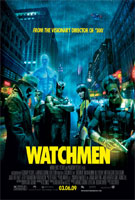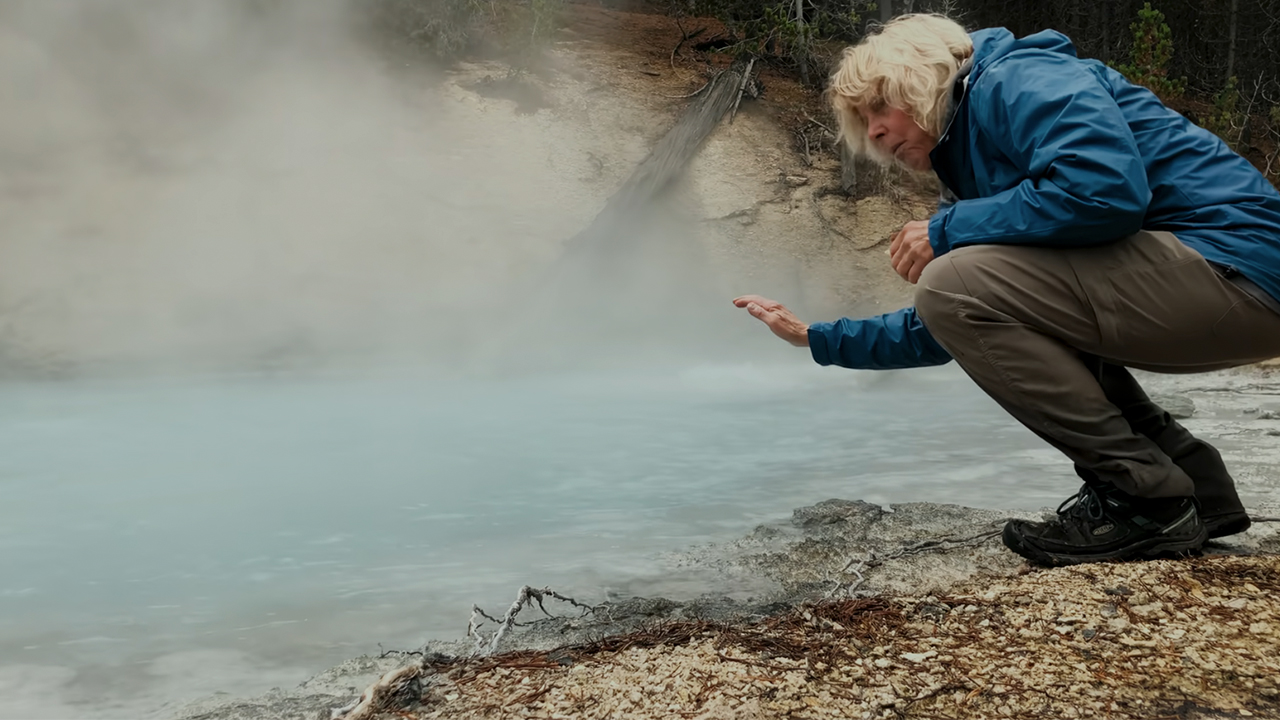To me it wouldn’t have mattered if it were bad or good. More important in a Watchmen movie is that it’s ambitious. That it tries to say something, to be something, even if it implodes amidst the struggle to achieve it. Better a spectacular failure than miserable, lukewarm mediocrity. Alan Moore’s amazing comic deserves, and gets better than tepid tap water dripped out of Hollywood’s rusty faucet. As a movie Watchmen is every bit as risky, edgy, and aspiring as it ought to be. As a bonus it’s also really, really good.
Directed by Zack Snyder using a slavishly faithful script adapted, from what is often considered to be the greatest comic ever written, by David Hayter and Alex Tse; Watchmen shies away from none of the brutal and deeply thoughtful tones of its source material. The comic book is dense, the comic is complicated, the comic is filled with more characters and brilliant ideas than anyone could ever fit on screen in a single movie, even a 163 minute one. Yet Snyder does it, without losing any of what made Watchmen so perfect, so genre changing in the first place.
Snyder squeezes it all in with a few key changes. The comic’s complicated ending is modified and replaced with something simpler to explain, but with most of the same impact, meaning, and ideas. It’s a masterstroke of adaptation and while, speaking as a fan of the comic, it’s not as good as the final solution in Dave Gibbons and Alan Moore’s original, it’s literally the only way this movie could have been done. It frees up massive chunks of time for Snyder to focus in on the real heart of the matter, the people who make up Watchmen’s world and the desperately dark path their society, and in a way our society, is on.
Watchmen does not however, take place in our world. It’s set in an alternate universe, a parallel 1985, what our 1985 might have been had the superheroes we see in our comic books actually been given form, actually existed. In the world of Watchmen masked avengers came to prominence in the 50s. Not beings with super powers, but a realistic breed of hero who used earthly talents to fight crime and, in some cases, help America win the Vietnam War. Those heroes changed the course of human history, not drastically, but subtly enough that in this parallel place Richard Nixon has been elected to 5 terms as president and the Cold War which gripped our own country back then has pushed them to the brink of nuclear annihilation.
The film follows a cadre of different characters, most of them superheroes who dropped out of the heroing game after a governmental act banning masked avengers. Some retired, some went to work for the man, and then there’s Rorschach (Jackie Earle Haley) for whom ban or no ban, there is no compromise. Through Rorschach we’re launched into the lives of a group of former heroes, some his contemporaries, others his predecessors. Rorschach, tenacious, damaged, and full of hate investigates the death of The Comedian, whose life we see intermingled with others in skillfully used flashbacks. Gradually the story of these people’s past and present is told and in the process a bigger, broader, more frightening, audacious story; one with dire implications to humanity as a whole, begins to unfold.
More than a movie about men in tights facing off against bad guys, Watchmen is about people trapped in a world spiraling out of control. It’s a superhero movie without a self-evident nemesis to battle, or an obvious evil plot to foil. Adrian Veidt, self-styled smartest man in the world declares his battle to be one against all that is bad in humanity. He’s not battling crooks or killers, his fight, and in the end Watchmen’s fight, is against the rot inside mankind’s soul.
First though, there’s a murder mystery to solve. Rorschach suspects someone is out to kill masked heroes, and sets off to warn his fellow avengers. We meet Dr. Manhattan (Billy Crudup), the only character with real super-powers, and a detached god complex to go with it. With him is his girlfriend Laurie Jupiter (Malin Ackerman), his only remaining connection with humanity. As he becomes more godlike, his interest in us is rapidly fading. We meet Dan Dreiberg, formerly known as Nite Owl (now retired) and the closest thing Rorschach has to a friend. Patrick Wilson plays Drieberg and at first his performance is off-putting. It’s as if Dreiberg is doing a never ending Clark Kent impression. But he develops and you realize there’s more going on. This is a man uncomfortable in his own skin, a man without purpose or direction, mourning for something he’s lost but doesn’t want to admit he needs back. Clark Kent is a persona Superman puts on to hide his real identity, but for Dreiberg an impotent, awkward Clark Kent amalgam is all that’s left once he’s been stripped of his mask, stripped of who he is.
Wilson’s performance is indicative of so much of what’s going on in this movie, more than it seems and often not what it appears to be. It dares to tackle things beyond the by now over-explored notions of good and evil, heroes and villains. This is the deconstruction of the superhero, which was begun last summer with The Dark Knight, taken right to the edge. It’s a movie with a deeply troubled soul, as troubled as the one hovering inside us all. Dipping into those dark corners requires something unflinchingly adult, and Watchmen delivers, refusing to shy away from broken bones, horrifying travesties, and more than occasionally, the naked human body. To do otherwise would be a betrayal, not only of its source material but of the basic truths of our existence, poured like molten lead into the movie’s core.
Snyder has found the right people for these roles and gets in almost every instance, stunning performances. Here’s the exception: Laurie’s mother Sally is a minor part of the film, but Carla Gugino’s take on her is nothing short of an abortion. It’s a disastrous turn, made only worse by a failed attempt to age her with bad makeup. She’s handles heady and meaningful dialogue with all the panache of a hastily put together, boozy SNL skit, the kind that goes horribly wrong and invariably results in whoever the current cast’s token fat guy is, bursting out into laughter somewhere slightly out of frame.
Any minor problems in Watchmen’s script are more a result of what’s missing than what’s been done. In particular the movie’s big finale, which should be shocking and horrifying, ends up feeling cold and clinical. It’s not because of any particular mishandling. Instead we’re talking about an honest byproduct of limited running time. We never get the chance to know the common man, whom the movie’s central disaster affects. There’s no time for Snyder to let us sit down with the guy on the corner to talk politics, or really step inside the life of normal, non-hero characters like Rorschach’s psychiatrist or Dreiberg’s mentor Hollis Mason. For the pain of the world to hurt, to have real meaning, we needed to see that. With an already expansive running time, there’s no way to do it. Instead you’ll connect with Dan and Laurie. You’ll ache for Dr. Manhattan’s lost humanity. You’ll sicken with anger over the things Rorschach has seen and suffered. With his stopwatch ticking, Snyder doubles down on the emotional investment in his primary characters, and that’s more than enough to see Watchmen through.
What matters most is that this is a movie with ambition, a movie with balls, a movie unafraid to tear across the screen leaving a trail of broken lives and unanswered, frightening questions in its wake. It revels in moral bankruptcy and delights in forcing on its characters into unmakeable choices. Stunning visuals exist in the service of ideas, not cheap thrills. It hinges not on some particular, awe-inspired action sequence, but on the quiet conversations of people struggling to save a world gone made. They’re different from us only in that when they talk, instead of punctuation marks, they use fists. When the material on which it’s based first hit stands, it forever changed the world of superhero comics. If successful, Watchmen may do the same for superhero films.












